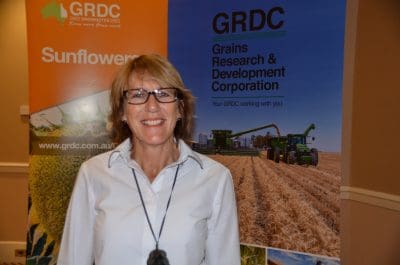THE Grains Research and Development Corporation (GRDC) believes Australian agriculture in the future will be about improving efficiency, sustainability and consistent supply of quality products.
Greater emphasis will need to be placed on inputs, storage, waste, distribution and ultimately farm profitability rather than perhaps just production.
Growers will continue to innovate, develop and uptake technologies, this is about farming smarter not necessarily harder.
Australian farmers have increased production over the last 50 years despite declining terms of trade, but agricultural total factor productivity growth has slowed to around 1.7 per cent per annum.
Production costs including availability of labour, increasing business scale, climatic variability, increasing market demands for product quality, worker safety and environmental management are all increasing pressures on farm business to remain profitable and sustainable.
While broadacre agriculture industries have realised the productivity benefits of auto-steer, global positioning system (GPS), guidance technologies and camera sprays, the productivity opportunities from satellite imagery, proximal sensors, variable rate technology, unmanned aerial vehicles and potential advances in autonomous systems and robotics have not been widely advanced.
The GRDC is looking to recent advances in agricultural engineering and automation as potentially offering the most significant opportunities for the grains industry.
This includes reducing the cost of farming inputs, increasing farm safety and reducing labour costs which could result in increased efficiencies and profit outcomes for grain growers.
To further understand how data driven technologies can boost production, the GRDC has joined with the Cotton Research Development Corporation (CRDC) to identify key issues challenging the grains and cotton industries’ adoption of autonomous systems.
These issues include:
- Improvement required for grain and cotton crop canopy management, nutrient use efficiency and crop quality through continuous automated soil water sensing and crop surveillance
- Lack of grower confidence in current Precision Agriculture (PA) systems due to a high level of assumptions in decision support systems which requires input of real-time data for validating yield gaps
- Increasing complexity of farming enterprise operations arising from both increasing volumes of data and looking to optimise operations more tightly, and at finer scales, than ever before
- Addressing a need for increased grain and cotton industry profitability, labour availability and costs, enabling new farming practices and enhanced industry safety through automation of routine processes.
Work to address these issues is underway with the GRDC and CRDC collectively investing in a three-themed project called ‘Future Farm Program.’
This will focus on the sensing system component as well as on developing a decision support tool to combine sensor derived input with fertiliser decision and other sources of information such as weather or grain prices.
The final stage will focus on an autonomous robotic platform from which such a sensing system may be deployed.
It is expected that this program will help to enable future Australian agriculture to hone its efficiency and sustainability through adoption of new technologies and utilisation of data to increase our profitability and maintain our edge over international neighbours.
To reach the next phase of our productivity gains, this is an absolute necessity.
The major partners for this project include CSIRO, The University of Sydney (USYD), The University of Southern Queensland (USQ), and Queensland University of Technology (QUT) and The Victorian Department of Economic Development, Jobs, Transport and (VicDEDJTR).


HAVE YOUR SAY